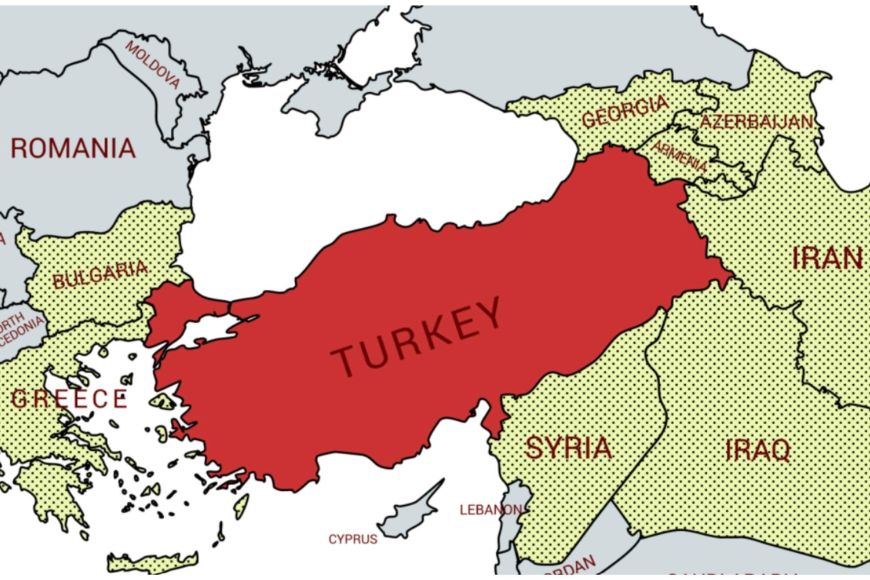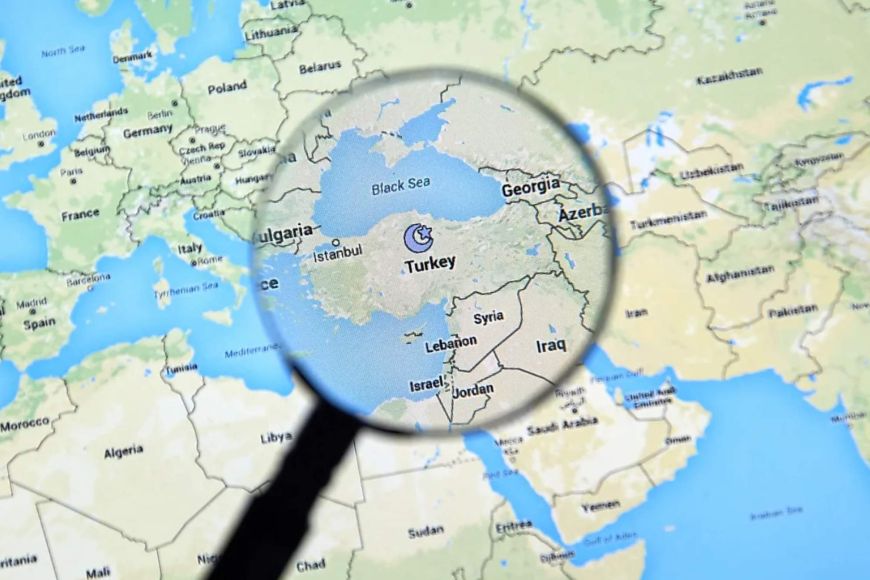Turkey, strategically located at the crossroads of Europe and Asia, is a country rich in history, culture, and geopolitical significance. This unique position makes Turkey a fascinating nation surrounded by diverse neighbors. Understanding the countries near Turkey is essential for appreciating its regional influence and the intricate web of relationships it maintains with its neighbors. This article explores the countries bordering Turkey, their cultural ties, geopolitical dynamics, and how these relationships shape the region.
The Map of Turkey and Surrounding Countries
Turkey is bordered by eight countries, each contributing to its geopolitical landscape. A map of Turkey and surrounding countries reveals its strategic importance and the complexity of its regional interactions. The countries bordering Turkey are Greece and Bulgaria to the northwest, Georgia to the northeast, Armenia, Azerbaijan (Nakhchivan exclave), and Iran to the east, and Iraq and Syria to the south. Additionally, Turkey is surrounded by three major bodies of water: the Aegean Sea to the west, the Black Sea to the north, and the Mediterranean Sea to the south.
Countries Bordering Turkey
Greece
Geographical Proximity and Historical Ties: Greece, located to the northwest of Turkey, shares both land and maritime borders with Turkey. The historical ties between the two countries are extensive, dating back to ancient civilizations and continuing through various periods of conflict and cooperation.
Cultural and Economic Exchange: Despite occasional political tensions, Greece and Turkey engage in significant cultural and economic exchanges. Tourism is a major industry that benefits both countries, with many Greeks and Turks visiting each other's historical sites and enjoying shared culinary traditions.
Bulgaria
Historical Relations and Cooperation: Bulgaria lies to the northwest of Turkey, sharing a land border that stretches from the Black Sea coast. Historically, Bulgaria and Turkey have had complex relations, but in recent years, they have cooperated extensively within the framework of NATO and the European Union.
Economic and Cultural Links: Economic ties between Bulgaria and Turkey are strong, particularly in trade and energy. Additionally, there is a significant Turkish minority in Bulgaria, which helps foster cultural links between the two nations.

Georgia
Strategic Partnership: Located to the northeast of Turkey, Georgia shares a crucial border with Turkey. The two countries enjoy a strategic partnership, particularly in the areas of energy and transportation. The Baku-Tbilisi-Ceyhan pipeline is a testament to their cooperation, transporting oil from the Caspian Sea to the Mediterranean.
Cultural Interactions: Cultural interactions between Georgia and Turkey are vibrant, with mutual influences in music, cuisine, and traditions. Georgian wine and Turkish tea are popular in both countries, symbolizing the deep-rooted cultural exchange.
Armenia
Historical Complexities: Armenia lies to the east of Turkey, sharing a border that remains officially closed due to historical and political tensions. The legacy of the Armenian Genocide and the Nagorno-Karabakh conflict with Azerbaijan continue to impact relations.
Efforts Towards Reconciliation: Despite these challenges, there have been efforts towards reconciliation and dialogue, driven by both governmental and non-governmental organizations. Cultural initiatives and people-to-people contacts play a crucial role in fostering understanding and cooperation.
Azerbaijan (Nakhchivan Exclave)
Geopolitical Significance: The Nakhchivan exclave of Azerbaijan borders Turkey to the east. This border is significant for both countries, facilitating direct land connections and enhancing strategic ties.
Economic and Energy Cooperation: Turkey and Azerbaijan enjoy robust economic and energy cooperation, with projects like the Trans-Anatolian Natural Gas Pipeline (TANAP) exemplifying their strategic partnership. Cultural ties are also strong, with shared language and traditions fostering close relations.
Iran
Historical and Cultural Bonds: Iran, located to the east of Turkey, shares a long history of cultural and political interactions. Both countries have influenced each other profoundly in areas such as art, architecture, and cuisine.
Geopolitical Dynamics: The geopolitical dynamics between Iran and Turkey are complex, involving cooperation and competition in regional conflicts and energy markets. Despite differences, both countries have managed to maintain a pragmatic relationship based on mutual interests.
Iraq
Shared Border and Historical Connections: Iraq lies to the south of Turkey, sharing a long and porous border. The historical connections between the two countries are deep, dating back to the Mesopotamian civilizations.
Economic and Security Concerns: Economic and security concerns dominate the relationship between Iraq and Turkey. The presence of Kurdish populations in both countries and the impact of regional conflicts necessitate close cooperation on security issues. Additionally, Turkey is a significant trade partner for Iraq, particularly in the construction and energy sectors.
Syria
Historical and Political Complexity: Syria, located to the south of Turkey, shares a tumultuous border with Turkey. The Syrian Civil War has had profound implications for Turkish-Syrian relations, leading to significant security and humanitarian challenges for Turkey.
Humanitarian Efforts and Security Concerns: Turkey has been at the forefront of humanitarian efforts, hosting millions of Syrian refugees and providing aid. Security concerns, particularly related to terrorism and border stability, continue to shape the interactions between the two countries.
Countries Next to Turkey: Regional Influence and Cultural Exchange
As Turkey continues to navigate its relationships with neighboring countries, its strategic importance and cultural influence remain key factors in regional stability and development. The countries next to Turkey are not just geographical neighbors but integral parts of a shared history and future, shaping the destiny of this vibrant and dynamic region.
Southeastern Europe and the Balkans
Turkey's influence in the Balkans is profound, reflecting deep historical ties from the era of the Ottoman Empire and ongoing cultural and economic interactions. This region is vital to Turkey’s strategy due to shared history, cultural affinities, and geopolitical considerations. Countries like Serbia, Kosovo, and Bosnia and Herzegovina have significant Turkish communities that serve as cultural bridges, maintaining and fostering strong links with Turkey.
Economic partnerships between Turkey and the Balkans are dynamic and multifaceted. Turkey's involvement in the Balkans includes various infrastructure projects, such as highways, bridges, and energy facilities, which are crucial for regional development. Turkish construction companies are prominent in the Balkans, building essential infrastructure that facilitates trade and mobility.
Trade between Turkey and the Balkans is robust, encompassing a wide range of goods and services, supported by numerous bilateral agreements that aim to reduce trade barriers and promote economic cooperation.
The Caucasus Region
The Caucasus region, consisting of Georgia, Armenia, and Azerbaijan, is of strategic importance to Turkey due to its geographical proximity and critical energy transit routes. Turkey’s strategic interests in the Caucasus are largely driven by its role as a transit country for energy resources, such as the Baku-Tbilisi-Ceyhan (BTC) pipeline, which transports oil from the Caspian Sea to the Mediterranean, enhancing energy security for Turkey and solidifying its position in the global energy market.
Cultural links in the Caucasus are deeply rooted in shared traditions, languages, and historical connections. The cultural ties between Turkey and Georgia are strong, with shared traditions in music, dance, and cuisine, fostering a unique blend of Turkish and Georgian influences. Azerbaijan and Turkey share a close cultural and linguistic bond, often described as "one nation, two states," reflected in joint cultural festivals, educational exchanges, and collaborative media projects. Despite historical tensions, there are efforts to foster cultural understanding between Turkey and Armenia through initiatives like academic collaborations, cultural exchanges, and dialogue programs.
The Middle East and North Africa (MENA)
Turkey’s influence extends to the broader Middle East and North Africa (MENA) region, where it plays a key role in regional politics, trade, and cultural exchange. Turkey often acts as a mediator in regional conflicts, leveraging its strategic position and historical ties to foster dialogue and peace, including involvement in the Syrian conflict, supporting peace talks in Libya, and mediating disputes among Gulf states. Turkey's significant investments in construction, energy, and manufacturing in the MENA region enhance its role as a major economic player.
Cultural and religious ties significantly shape Turkey’s interactions with the MENA region. The relationship between Turkey and Egypt is historically rich, with deep cultural and religious ties, despite recent political differences. Turkish soap operas are immensely popular in Egypt, reflecting shared cultural tastes. Turkey maintains strong cultural and religious ties with Saudi Arabia and other Gulf states, reinforced through pilgrimage tourism, educational exchanges, and collaborative cultural projects. In North Africa, countries like Libya, Tunisia, and Algeria have strong historical connections with Turkey dating back to the Ottoman era, manifested in economic partnerships, cultural exchanges, and political cooperation.

Geopolitical Dynamics: Turkey's Role in the Region
NATO and the European Union
Strategic Alliances: As a member of NATO and a candidate for EU membership, Turkey plays a crucial role in regional security and political dynamics. Its strategic position enhances its importance in transatlantic alliances.
EU Membership Aspirations: Turkey's aspirations for EU membership influence its domestic and foreign policies, driving reforms and fostering closer ties with European countries.
Regional Conflicts and Diplomacy
Mediator Role: Turkey often acts as a mediator in regional conflicts, leveraging its strategic position and diplomatic influence. Its involvement in peace negotiations and conflict resolution efforts underscores its regional significance.
Balancing Relationships: Balancing relationships with neighboring countries and major powers is a key aspect of Turkey's foreign policy, ensuring its stability and influence in a volatile region.
Turkey's unique geographical position, bordering eight countries and surrounded by key bodies of water, makes it a pivotal player in regional and global geopolitics. The countries near Turkey each contribute to the complex tapestry of relationships that define the region. Understanding the map of Turkey and surrounding countries provides insight into the cultural, economic, and political dynamics that shape Turkey's interactions with its neighbors.
From the historical ties with Greece and Bulgaria to the strategic partnerships with Georgia and Azerbaijan, and the complex relationships with Iran, Iraq, and Syria, Turkey's role as a regional power is multifaceted. The intricate web of connections with countries bordering Turkey highlights its importance as a bridge between Europe and Asia, the Middle East, and the Caucasus.
As Turkey continues to navigate its relationships with neighboring countries, its strategic importance and cultural influence remain key factors in regional stability and development. The countries next to Turkey are not just geographical neighbors but integral parts of a shared history and future, shaping the destiny of this vibrant and dynamic region.
We are always ready to answer all your questions, please reach out via Whatsapp +90 (532) 158 42 44
If you want to emigrate or buy an apartment in Turkey or own a property in turkey and enjoy life by the sea, message our specialists who will find the best options for your budget.
Also, subscribe to our YouTube channel and Instagram page to receive information from the professionals!
An additional channel to connect with us: Telegram
Team Tolerance | 20 years alongside you
